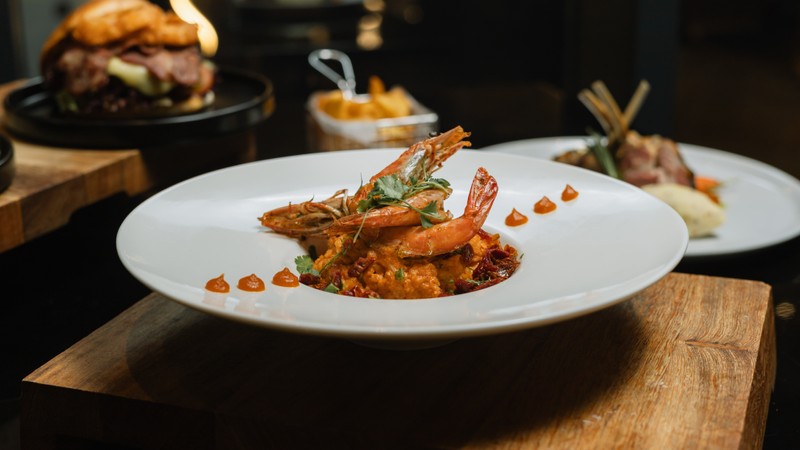When it comes to perfecting the taste of summer, the juice really is worth the squeeze for Gqeberha chefs Tyran Vaghi and Mthobeli “Sunshine” Ndaleni.
Being based in one of South Africa’s biggest citrus-growing regions is a constant source of inspiration for the pair and it comes as no surprise that lemon, lime and orange flavours are infused in many of their signature dishes.
A tropical fruit like pineapple, another homegrown favourite, is also used to mesmerising effect.
Blackened fish tacos with mango and pineapple, anyone?
The chefs, whose flair for the unique comes alive in the kitchens of the Radisson Blu Hotel in the city, are sticklers for sourcing local and fresh.
With two of the country’s largest export regions on their doorstep, citrus on your plate tonight was probably hand-picked on a farm in Addo or Patensie earlier in the day.
“People don’t think a dish is heavy if there’s fruit in it. We all think that way,” executive chef Vaghi said.
In a weird sense, this makes it the perfect foil for this time of the year when most of us aspires to be fit, thin and healthy.
While palates in the region enjoy a range of flavours, the fact that citrus is readily available in the warm, subtropical climate of the Eastern Cape make its use more prevalent than in, for example, Cape Town and Johannesburg.
These fruits are a staple in an assortment of dishes the two are rolling out in their summer menu this season.
Their panko prawns feature a lemon-based home-made aioli while the lemon and garlic chicken supreme speaks for itself. The line fish, prawn and calamari platter, meanwhile, is served with a lemon butter.
“Our risottos are finished with acid butter, which is a combination of lemon and lime,” Vaghi explained.
“Our pistachio frangipane is also done with a lime gel and lemon curd plays a big role in our cheesecake sundae.”
Coming up with a menu inspired by the flavours of a specific region does not happen overnight. Vaghi and sous chef Ndaleni have spent the better part of three months to conceptualise their latest creation.
Front of mind has been the importance of using local ingredients.
In addition to citrus, other fruits and vegetables are sourced from farms on the outskirts of Gqeberha.
“Something I am extremely proud of and love to showcase is that we are farm to table. It’s as fresh as it comes,” Vaghi said.
“The food our diners eat tonight only arrived a few hours prior to preparation. The majority of our products are made on site daily, so we keep everything as fresh and nutritious as possible.”
The Indian Ocean across the road provides plenty of bounty as well. Fresh salmon, which is locally smoked, is used extensively in a variety of dishes.
“Everything comes from around us,” Vaghi enthused. What the chefs have noticed is that South African food tends to be jampacked with every imaginable flavour, whereas in Europe and some other parts of the world the quality of the main ingredient is emphasised.
To quote a well-coined phrase, it remains the star of the show. The rest is simply a supporting act to bring out the best in it. Ndaleni, who like his colleague has worked in kitchens abroad, said it was important to expose locals to global food trends to broaden the scope of what they might enjoy.
In his view, menus – and especially those in summer – should be about simplicity to “show off” the cut of meat or fillet of fish.
They should also be of the sort that would encourage diners to talk about the food, he said.
“And, very importantly,” Vaghi added, “food you would not feel guilty about eating.”
Tacos and tapas, finger foods that could be shared by groups of friends, were essential to the season and these should feature prominently on any summer menu, he said. -IOL



Leave a Reply